This article needs additional citations for verification .(January 2021) |
| Millennium: | 1st millennium BC |
| Centuries: | |
| Decades: | |
| Years: | |
| Categories: |
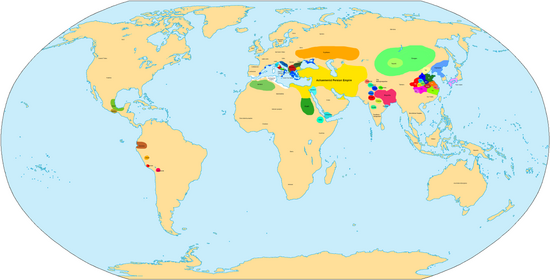
This article concerns the period 409 BC – 400 BC.
This article needs additional citations for verification .(January 2021) |
| Millennium: | 1st millennium BC |
| Centuries: | |
| Decades: | |
| Years: | |
| Categories: |

This article concerns the period 409 BC – 400 BC.
== {{dr|y|y|{{1x|-}}{{{year}}}0|{{1x|-}}{{{1}}}|na}} == {{trim|{{transcluded section|{{dr|y|y|{{1x|-}}{{{year}}}0|{{1x|-}}{{{1}}}|na}}}} {{#section-h::{{dr|y|y|{{1x|-}}{{{year}}}0|{{1x|-}}{{{1}}}|na}}|Events}}}} == {{dr|y|y|{{1x|-}}{{{year}}}0|{{1x|-}}{{{1}}}|na}} == {{trim|{{transcluded section|{{dr|y|y|{{1x|-}}{{{year}}}0|{{1x|-}}{{{1}}}|na}}}} {{#section-h::{{dr|y|y|{{1x|-}}{{{year}}}0|{{1x|-}}{{{1}}}|na}}|Events}}}} == {{dr|y|y|{{1x|-}}{{{year}}}0|{{1x|-}}{{{1}}}|na}} == {{trim|{{transcluded section|{{dr|y|y|{{1x|-}}{{{year}}}0|{{1x|-}}{{{1}}}|na}}}} {{#section-h::{{dr|y|y|{{1x|-}}{{{year}}}0|{{1x|-}}{{{1}}}|na}}|Events}}}} == {{dr|y|y|{{1x|-}}{{{year}}}0|{{1x|-}}{{{1}}}|na}} == {{trim|{{transcluded section|{{dr|y|y|{{1x|-}}{{{year}}}0|{{1x|-}}{{{1}}}|na}}}} {{#section-h::{{dr|y|y|{{1x|-}}{{{year}}}0|{{1x|-}}{{{1}}}|na}}|Events}}}} == {{dr|y|y|{{1x|-}}{{{year}}}0|{{1x|-}}{{{1}}}|na}} == {{trim|{{transcluded section|{{dr|y|y|{{1x|-}}{{{year}}}0|{{1x|-}}{{{1}}}|na}}}} {{#section-h::{{dr|y|y|{{1x|-}}{{{year}}}0|{{1x|-}}{{{1}}}|na}}|Events}}}} == {{dr|y|y|{{1x|-}}{{{year}}}0|{{1x|-}}{{{1}}}|na}} == {{trim|{{transcluded section|{{dr|y|y|{{1x|-}}{{{year}}}0|{{1x|-}}{{{1}}}|na}}}} {{#section-h::{{dr|y|y|{{1x|-}}{{{year}}}0|{{1x|-}}{{{1}}}|na}}|Events}}}} == {{dr|y|y|{{1x|-}}{{{year}}}0|{{1x|-}}{{{1}}}|na}} == {{trim|{{transcluded section|{{dr|y|y|{{1x|-}}{{{year}}}0|{{1x|-}}{{{1}}}|na}}}} {{#section-h::{{dr|y|y|{{1x|-}}{{{year}}}0|{{1x|-}}{{{1}}}|na}}|Events}}}} == {{dr|y|y|{{1x|-}}{{{year}}}0|{{1x|-}}{{{1}}}|na}} == {{trim|{{transcluded section|{{dr|y|y|{{1x|-}}{{{year}}}0|{{1x|-}}{{{1}}}|na}}}} {{#section-h::{{dr|y|y|{{1x|-}}{{{year}}}0|{{1x|-}}{{{1}}}|na}}|Events}}}} == {{dr|y|y|{{1x|-}}{{{year}}}0|{{1x|-}}{{{1}}}|na}} == {{trim|{{transcluded section|{{dr|y|y|{{1x|-}}{{{year}}}0|{{1x|-}}{{{1}}}|na}}}} {{#section-h::{{dr|y|y|{{1x|-}}{{{year}}}0|{{1x|-}}{{{1}}}|na}}|Events}}}}
== {{ucfirst:{{{1}}}}} == {{preprocess|{{((}}transcluding articles {{!}} {{for loop|{{!}}|call=Year article|pc1n=1|pc1v={{{decade}}}0|pv=2|-9|-8|-7|-6|-5|-4|-3|-2|-1}} {{!}} {{#ifeq:{{{decade}}}|-0|{{void|There is no BC year 0}}|{{Year article|{{{decade}}}0}}}} {{))}}}} {{for loop| |call=Transclude {{{1}}}|{{{decade}}}9|{{{decade}}}8|{{{decade}}}7|{{{decade}}}6|{{{decade}}}5|{{{decade}}}4|{{{decade}}}3|{{{decade}}}2|{{{decade}}}1}} {{#ifeq:{{{decade}}}|-0|{{void|There is no BC year 0}}| {{Transclude {{{1}}}|{{{decade}}}0}} }} == {{ucfirst:{{{1}}}}} == {{preprocess|{{((}}transcluding articles {{!}} {{for loop|{{!}}|call=Year article|pc1n=1|pc1v={{{decade}}}0|pv=2|-9|-8|-7|-6|-5|-4|-3|-2|-1}} {{!}} {{#ifeq:{{{decade}}}|-0|{{void|There is no BC year 0}}|{{Year article|{{{decade}}}0}}}} {{))}}}} {{for loop| |call=Transclude {{{1}}}|{{{decade}}}9|{{{decade}}}8|{{{decade}}}7|{{{decade}}}6|{{{decade}}}5|{{{decade}}}4|{{{decade}}}3|{{{decade}}}2|{{{decade}}}1}} {{#ifeq:{{{decade}}}|-0|{{void|There is no BC year 0}}| {{Transclude {{{1}}}|{{{decade}}}0}} }}

The Peloponnesian War was an ancient Greek war fought between Athens and Sparta and their respective allies for the hegemony of the Greek world. The war remained undecided for a long time until the decisive intervention of the Persian Empire in support of Sparta. Led by Lysander, the Spartan fleet built with Persian subsidies finally defeated Athens and started a period of Spartan hegemony over Greece.

The 5th century BC started the first day of 500 BC and ended the last day of 401 BC.
Year 404 BC was a year of the pre-Julian Roman calendar. At the time, it was known as the Year of the Tribunate of Volusus, Cossus, Fidenas, Ambustus, Maluginensis and Rutilus. The denomination 404 BC for this year has been used since the early medieval period, when the Anno Domini calendar era became the prevalent method in Europe for naming years.
Year 408 BC was a year of the pre-Julian Roman calendar. At the time, it was known as the Year of the Tribunate of Iullus, Ahala and Cossus. The denomination 408 BC for this year has been used since the early medieval period, when the Anno Domini calendar era became the prevalent method in Europe for naming years.
This decade witnessed the continuing decline of the Achaemenid Empire, fierce warfare amongst the Greek city-states during the Peloponnesian War, the ongoing Warring States period in Zhou dynasty China, and the closing years of the Olmec civilization in modern-day Mexico.
This article concerns the period 399 BC – 390 BC.

Lysander was a Spartan military and political leader. He destroyed the Athenian fleet at the Battle of Aegospotami in 405 BC, forcing Athens to capitulate and bringing the Peloponnesian War to an end. He then played a key role in Sparta's domination of Greece for the next decade until his death at the Battle of Haliartus.
Year 406 BC was a year of the pre-Julian Roman calendar. At the time, it was known as the Year of the Tribunate of Cossus, Ambustus, Cossus and Potitus. The denomination 406 BC for this year has been used since the early medieval period, when the Anno Domini calendar era became the prevalent method in Europe for naming years.
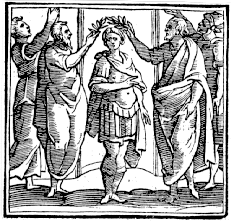
Thrasybulus was an Athenian general and democratic leader. In 411 BC, in the wake of an oligarchic coup at Athens, the pro-democracy sailors at Samos elected him as a general, making him a primary leader of the ultimately successful democratic resistance to the coup. As general, he was responsible for recalling the controversial nobleman Alcibiades from exile, and the two worked together extensively over the next several years. In 411 and 410, Thrasybulus was in command along with Alcibiades and others at several critical Athenian naval victories.

Alcibiades was a prominent Athenian statesman, orator, and general. He was the last of the Alcmaeonidae, which fell from prominence after the Peloponnesian War. He played a major role in the second half of that conflict as a strategic advisor, military commander, and politician.
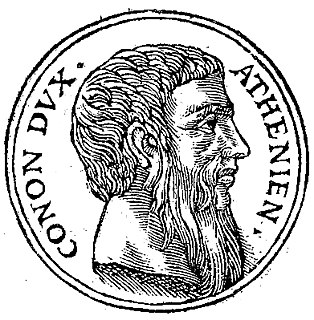
Conon was an Athenian general at the end of the Peloponnesian War, who led the Athenian naval forces when they were defeated by a Peloponnesian fleet in the crucial Battle of Aegospotami; later he contributed significantly to the restoration of Athens' political and military power.
Year 412 BC was a year of the pre-Julian Roman calendar. At the time, it was known as the Year of the Consulship of Ambustus and Pacilus. The denomination 412 BC for this year has been used since the early medieval period, when the Anno Domini calendar era became the prevalent method in Europe for naming years.

Cyrus the Younger was a Achaemenid prince and general. He ruled as satrap of Lydia and Ionia from 408 to 401 BC. Son of Darius II and Parysatis, he died in 401 BC in battle during a failed attempt to oust his elder brother, Artaxerxes II, from the Persian throne.

Clearchus or Clearch, the son of Rhamphias, was a Spartan general and mercenary, noted for his service under Cyrus the Younger.
Theramenes was an Athenian statesman, prominent in the final decade of the Peloponnesian War. He was particularly active during the two periods of oligarchic government at Athens, as well as in the trial of the generals who had commanded at Arginusae in 406 BC. A moderate oligarch, he often found himself caught between the democrats on the one hand and the extremist oligarchs on the other. Successful in replacing a narrow oligarchy with a broader one in 411 BC, he failed to achieve the same end in 404 BC, and was executed by the extremists whose policies he had opposed.
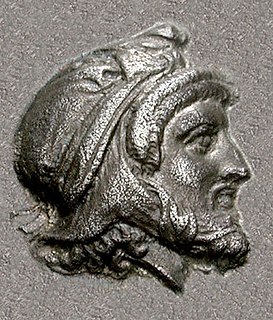
Pharnabazus II was a Persian soldier and statesman, and Satrap of Hellespontine Phrygia. He was the son of Pharnaces II of Phrygia and grandson of Pharnabazus I, and great-grandson of Artabazus I. He and his male ancestors, forming the Pharnacid dynasty, had governed the satrapy of Hellespontine Phrygia from its headquarters at Dascylium since 478 BC. He married Apama, daughter of Artaxerxes II of Persia, and their son Artabazus also became a satrap of Phrygia. According to some accounts, his granddaughter Barsine may have become Alexander the Great's concubine.
The naval Battle of Arginusae took place in 406 BC during the Peloponnesian War near the city of Canae in the Arginusae islands, east of the island of Lesbos. In the battle, an Athenian fleet commanded by eight strategoi defeated a Spartan fleet under Callicratidas. The battle was precipitated by a Spartan victory which led to the Athenian fleet under Conon being blockaded at Mytilene; to relieve Conon, the Athenians assembled a scratch force composed largely of newly constructed ships manned by inexperienced crews. This inexperienced fleet was thus tactically inferior to the Spartans, but its commanders were able to circumvent this problem by employing new and unorthodox tactics, which allowed the Athenians to secure a dramatic and unexpected victory. Slaves and metics who participated in the battle may have been granted Athenian citizenship.
The Battle of Notium in 406 BC was a Spartan naval victory in the Peloponnesian War. Prior to the battle, the Athenian commander, Alcibiades, left his helmsman, Antiochus, in command of the Athenian fleet, which was blockading the Spartan fleet in Ephesus. In violation of his orders, Antiochus attempted to draw the Spartans into battle by tempting them with a small decoy force. His strategy backfired, and the Spartans under Lysander scored a small but symbolically significant victory over the Athenian fleet. This victory resulted in the downfall of Alcibiades, and established Lysander as a commander who could defeat the Athenians at sea.
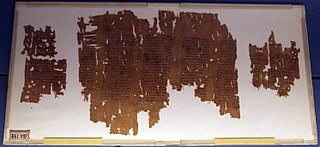
Hellenica simply means writings on Greek (Hellenic) subjects. Several histories of 4th-century Greece, written in the mould of Thucydides or straying from it, have borne the conventional Latin title Hellenica. The surviving Hellenica is an important work of the Ancient Greek writer Xenophon and one of the principal sources for the last seven years of the Peloponnesian War not covered by Thucydides, as well as the war's aftermath.

Classical Greece was a period of around 200 years in Ancient Greece, marked by much of the eastern Aegean and northern regions of Greek culture gaining increased autonomy from the Persian Empire; the peak flourishing of democratic Athens; the First and Second Peloponnesian Wars; the Spartan and then Theban hegemonies; and the expansion of Macedonia under Philip II. Much of the early defining politics, artistic thought, scientific thought, theatre, literature and philosophy of Western civilization derives from this period of Greek history, which had a powerful influence on the later Roman Empire. The Classical era ended after Philip II's unification of most of the Greek world against the common enemy of the Persian Empire, which was conquered within 13 years during the wars of Alexander the Great, Philip's son.